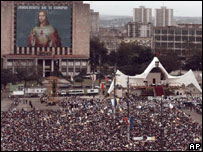12.1 Historical overview of the 20th century (1980-1999).

During this period of the 20th century (1980-1999) in Cuba, specifically from 1980 to 1985, there were significant advances and achievements in economic and social development, even as the imperialist aggression and adverse weather conditions increased. However, after 1985, certain deficiencies and negative trends began to become evident, primarily related to the implementation of the management and planning system.
In 1986, specifically in the month of April, Fidel Castro outlined the need to begin a process of correcting errors and negative tendencies that would address the problems that hindered and distorted the vital and unique principles of the Cuban Revolution, such as unwavering popular participation in decisions and tasks, as well as the unity of economic and social development.
Despite the shortcomings and the need to perfect socialist work, the Cuban people achieved truly astonishing achievements in those years. In healthcare, a comprehensive system was created, ranging from family doctors and polyclinics to specialized hospitals and research centers.
In education, Cuba had the highest literacy rate in Latin America, with an average of nine grades. In sports, our country ranked among the top ten countries in the world. Important research centers and children’s hospitals were also established during this period.
In 1989, Cuba consolidated 85% of its trade relations with the USSR and the rest of the socialist bloc. This exchange established fair prices that avoided the unequal exchange characteristic of relations with developed capitalist countries. At the same time, the supply of technologies and the availability of credits with satisfactory terms and interest rates were guaranteed.
During these years, the collapse of the socialist bloc and the disintegration of the Soviet Union began. These events had a dramatic impact on Cuban society, as the country’s economy was integrated into that community. This integration was further conditioned by the cruel and illegal blockade that the United States maintained and continues to maintain on Cuba since the early years of the Revolution.
With the fall of socialism in Europe and the disintegration of the USSR, Cuba’s purchasing power fell in a very short period from 8.139 billion pesos in 1989 to 2 billion pesos in 1993.
In 1991, the Fourth Congress of the PCC was held, where the situation was analyzed and the need to save the Revolution was emphasized. At this congress, significant agreements were reached regarding amendments to the Constitution and the Party statutes, and the foundations for the strategy to resist and begin recovery were laid.
A series of measures were then implemented to increase economic efficiency and competitiveness, address domestic debt, improve internal financial stability, reinsert itself in the international economy, stimulate foreign capital investment, and strengthen Cuban state-owned enterprises.
US imperialism and the Miami-based groups carried out various actions to dishonor the Revolution, destabilize it, and further intensify the economic blockade. Thus, in mid-1992, the US government approved the “Torricelli Act,” which granted the President of the United States the power to apply economic sanctions to countries that maintain trade relations with Cuba and prohibited trade with our country by subsidiaries of US companies based in third countries.
In February 1993, the most acute year of the crisis in Cuba, elections were held whose results demonstrated the people’s support for the Revolution: 99.7% of voters cast their ballots, and only 7.3% cast blank or spoiled ballots.
Between 1993 and 1994, the Cuban government implemented certain economic liberalization measures: free peasant agricultural markets, small private service businesses such as restaurants and cafes, and self-employment in general; until then, only work with state-owned enterprises was permitted.
In July 1994, boat thefts by individuals under pressure primarily due to the economic situation increased, although there were cases in which murders occurred. Among these events was the robbery of the tugboat 13 de Marzo, which was boarded by more than 60 people intending to transit to the United States. Despite warnings about the vessel’s poor condition, they fled, pursued by other tugboats, one of which collided with the one being pursued, resulting in an accident. All the vessels that arrived at the scene made extensive rescue efforts, but were unable to prevent the deaths of approximately 32 people. A major campaign was launched regarding this accident, accusing the Cuban government of ordering the vessel’s sinking.
It was then that the Cuban government decided not to curb illegal departures, a measure that forced the U.S. administration to sit at the negotiating table and sign a migration agreement with Cuba on September 9, 1994. Subsequently, the United States found it necessary to take measures to discourage illegal departures to that country.
In July 1995, elections for delegates to People’s Power were held, where more than 87% of the electorate expressed their support for the Revolution. The Helms-Burton Act, signed by the U.S. government, established a total, absolute, and international economic blockade. It established various sanctions against companies and businesspeople who maintain economic relations with Cuba. It also legalized U.S. support for counterrevolutionary groups on the island.
This law has not only incited the rejection of the entire Cuban people, but also of virtually all the peoples of the planet, as well as international organizations and institutions. This is evidenced by the votes against the blockade at the UN and the OAS agreement rejecting the Helms-Burton Act.
In January 1998, the elections for candidates for deputies to the National Assembly of People’s Power and for delegates to the Provincial Assemblies were held. Ninety-four point three percent of the votes were cast, that is, for the candidate proposed by the National Electoral Commission.
That same month, Pope John Paul II visited our country. The entire population, believers and non-believers, provided a massive demonstration of hospitality and respect, both in their welcome and in the Masses he offered. The entire world was able to witness the freedom with which His Holiness acted and expressed himself at all times.








